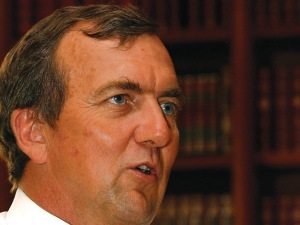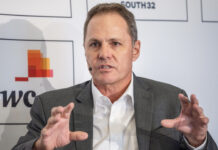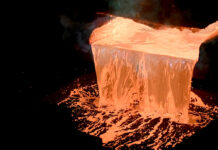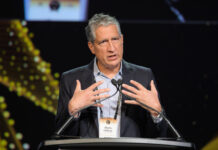
[miningmx.com] – THERE’S a certain irony in Randgold Resources CEO, Mark Bristow’s, admiration for the mining house leaders of old, such as Graham Boustred, the former deputy chairman of Anglo American.
“He was a leader in which you were in no doubt that decisions would get made, and that he’d drive a hard bargain,” said Bristow at a recent media lunch.
That’s roughly about where the comparisons between Boustred and Bristow end.
Whereas Anglo under Boustred was a sprawling empire, Bristow’s Randgold is a specialist, and run like a family business, with one eye fixed firmly on the till. Bristow’s personal wealth is closely attached to Randgold, a firm he founded in 1995, and has run since.
The figures speak for themselves.
During a 20-year period, in which the gold price has crashed twice, Randgold has never impaired a single asset; it has rarely had net debt; and it has never issued shares to finance itself, or buy assets. In fact, the company approved a two-for-one share split in 2004 because there were too few shares to trade easily.
“Never give your equity away,” is right out of the Bristow handbook of how not to destroy a gold business. And there are plenty of other not so fun facts which suggests that the world’s gold industry is the architect of its own problems.
One is the poor allocation of capital.
According to Bristow, the world’s top 20 gold mining businesses have raised $150bn of debt in 10 years yet they are producing the same amount of gold while their combined market capitalisation is unchanged in eight years. “That’s a lot of capital to just tread water,” said Bristow.
In contrast, Randgold has thrived.
In 2012, just as the gold price shed $400 per ounce, Randgold’s market value was equal to the combined value of the top 10 companies in its sector. Even today, it is still more valuable as a company than the other top 10 firms.
“The company retains an enviable position among gold producers with high quality assets capable of sustaining production rates and generating cash at lower prices,” said BMO Nesbitt Burns.
“The group has an enviable track record of growing low cost ounces in Africa with a well deserved premium rating,” said JP Morgan Cazenove in a report on August 6. It later went on to observe Randgold was well placed to capitalise on sector merger and acquisition activity.
A month later, Bristow’s Randgold unveiled a proposal with AngloGold Ashanti to joint venture the latter’s troublesome, but giant, Obuasi – a gold resource Bristow said was world class, but marred by a century of legacy issues, including unnamed environmental liabilities.
Bristow said the offer of a joint venture was more interesting than an earlier proposal by AngloGold that Randgold run the South African firm’s entire Continental Africa division – a claim AngloGold said was a mere case of spit-balling three years, long since abandoned.
There is something of the enfant terrible about Bristow. He loves to poke big companies in the eye.
For instance, it’s with a certain amount of glee that he reports how the world’s largest gold producer spent $9bn buying peer company, Placer Dome, only for its own market capitalisation to since fall to $7bn.
As for the gold industry, Bristow is less than optimistic. He sees further balance sheet stress from companies that overspent, or spent unwisely when the gold price touched $1,800/oz in 2011.
Now 56 years old, Bristow has no plans of retirement but adds he’d prefer not to ‘outstay his welcome’. It’s unlikely that will happen soon if his comments about “living to work’ are true.
“There’s a theory out there that you put your family first, play with the kids and have dinner with your wife,’ said Bristow. “But that’s what you do after work. When you run a big company, you get up early and you work for your money,’ he said.









